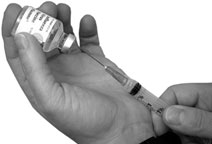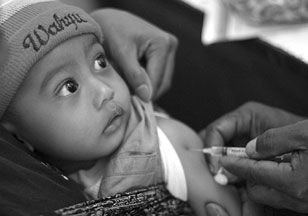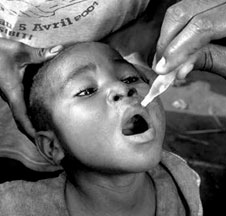|
Shot in the arm for immunisation program:
Towards a healthier nation
by Ananda KANNANGARA
 Various measures have been taken by the Health Ministry over the past
few years to eradicate 10 major diseases including hepatitis, smallpox,
measles and rubella from the country, Senior Epidemiologist of the
Health Ministry, Dr. Sudath Peiris told the Sunday Observer on the
National Immunisation Program (NIP). Various measures have been taken by the Health Ministry over the past
few years to eradicate 10 major diseases including hepatitis, smallpox,
measles and rubella from the country, Senior Epidemiologist of the
Health Ministry, Dr. Sudath Peiris told the Sunday Observer on the
National Immunisation Program (NIP).
Other diseases coming under the purview of the NIP are polio,
whooping cough, diphtheria and tetanus, he said.
On the eradication of dengue, Dr. Peiris said unlike most diseases,
no proper medication has still been found in the world to combat dengue.
"There are no vaccines to cure dengue and it is up to the public to
clean their surroundings and destroy mosquito breeding grounds," he
said.
On the long history of the National Immunisation Program, Dr. Peiris
said the country's first immunisation program commenced during the
colonial era, in 1887.
 The Rs. 450 million allocated by the Government every year
to safeguard people from diseases such as rubella, smallpox, measles and
polio will be increased in the future to make the National Immunisation
Program (NIP) a success. - Dr. Sudath Peiris The Rs. 450 million allocated by the Government every year
to safeguard people from diseases such as rubella, smallpox, measles and
polio will be increased in the future to make the National Immunisation
Program (NIP) a success. - Dr. Sudath Peiris |
"Since a large number of smallpox patients were reported from every
part of the country, the British rulers of the day started the NIP to
eliminate smallpox.
“The program was successful and the Government reactivated the NIP in
1943 to combat tuberculosis.
"Thereafter during the 1961-62 period, a large number of polio cases
was reported from many parts of the country and the Government had to
reactivate the NIP".
As a result the Health Department was able to combat the polio menace
to a great extent by spending a colossal sum of money.
Dr. Peiris said the NIP was given a facelift in 1978 and another
program was introduced under the theme Expanded Program of Immunisation
(EPI) with the objective of eliminating these diseases.
 During this period, the Health Department wanted to expand the
immunisation program to every nook and corner of the country. As a
result, the Department established new hospitals and MOH offices. During this period, the Health Department wanted to expand the
immunisation program to every nook and corner of the country. As a
result, the Department established new hospitals and MOH offices.
MOH offices
During this time, the Department also sought the assistance of the
World Health Organisation (WHO) and the United Nations Children's Fund
(UNICEF) to strengthen the immunisation program.
During the 1980s the Health Department set up over 300 MOH offices in
urban, remote and rural areas to treat people suffering from measles,
tetanus, whooping cough, hepatitis, smallpox and a few other diseases.
On the current position of these diseases, Dr. Peiris said with the
provision of adequate facilities by the Health Ministry and the MOH
offices, the spread of these diseases has been minimised to a great
extent.
 He said these diseases cannot be eliminated by vaccines alone and the
improvement of health facilities is also necessary. Therefore, the
Health Department's main objective is to establish more health care
centres islandwide and provide vaccines to needy people. He said these diseases cannot be eliminated by vaccines alone and the
improvement of health facilities is also necessary. Therefore, the
Health Department's main objective is to establish more health care
centres islandwide and provide vaccines to needy people.
"We have also planned to construct more buildings at existing
hospitals, provide sophisticated medical equipment and refrigerators to
store vaccines," Dr. Peiris said.
He said it is also necessary to develop transport services in
hospitals and the Department has already fulfilled that objective.
Dr. Peiris said vaccines are freely available in hospitals and the
authorities have launched special programs to prevent drug shortages.
"We import vaccines after calling for tenders through proper
procedures. We import these vaccines mainly from India, Belgium, Japan,
Korea, Thailand, USA and UK.
Adequate stocks
Dr. Peiris said no one can complain about the non-availability of
vaccines in hospitals as the Government has imported adequate stocks of
vaccines to help patients.
On the Schools’ Immunisation program, Dr. Peiris said priority is
always given to school programs and last year too many health camps were
conducted in schools.
 "We provide children with vaccines after a thorough medical check-up
conducted by specially appointed doctors," he said. "We provide children with vaccines after a thorough medical check-up
conducted by specially appointed doctors," he said.
About the publicity given to the health sector by the media, Dr.
Peiris said the media have to play a vital role to educate people,
especially the younger generation about the danger posed by these
diseases.
Dr. Peiris said the WHO and UNICEF have provided assistance to carry
out publicity programs.
Dr. Peiris said due to the success of the islandwide immunisation
program, the Health Department was able to bring down the number of
patients suffering from these diseases by more than 80 percent. He said
the ratio of deaths too had drastically reduced.
Dr. Peiris advised people to protect themselves from these diseases
by taking precautions.
"For example, some people are allergic to food such as mangoes,
tomatoes or tuna fish. Some people are allergic even to paracetamol".
He, therefore, requested people to be careful of what they consume
without making themselves vulnerable to these diseases.
|

